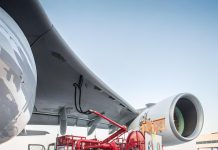Leadership, effectiveness, accountability, and relations with shareholders have been identified as some of the key principles to a robust corporate governance structure in the aviation industry in Nigeria. Mr. Ahmed Kuru, Managing Director of AMCON made this known while speaking to a cross-section of aviation elites at the NTM Colloquium which held in Lagos on Tuesday.
Mr. Ahmed Kuru explained that the need for corporate governance in the aviation industry is important as it is the major way to drive progress in the sector. He noted that for any change to be effected in the Corporate Governance of the Airline, it must be regulatory-driven as self-regulation has achieved little in past years. Mr. Kuru who was of the opinion that airports concession is the only way to achieve effectiveness and quality service delivery in the airports also noted that the cash flow for setting up Airlines must be professionally scrutinized to make business sense. According to him, the aviation industry operates on a low-profit-margin and a low-profit-margin requires prudence that can only come with good Corporate Governance.
Also speaking at the Colloquium is the Vice President, Pricing and Revenue Management Copa Airlines, Panama, Mr. Chris Amenechi. Mr. Amenechi examined the need for the airlines to hire the right executive management team. He stated that the industry needed investors and also it is important that the right management is employed putting into consideration a good compensation structure and financial plan that factors in growth strategy, deployment of information technology strategy, regulatory strategy as well as approved capital strategy.
Panel discussants at the colloquium comprising Capt. Dapo Olumide, Fubara Anga (SAN) and Kolawole Ayeye, pointed out issues bordering on airlines’ demarketing, intrigues among operators, use of wrong aircraft, fare structure and absence of truth by industry players.
Capt. Olumide noted that inefficiencies in the management model, on-time performance and the consequence of flight delays are issues that contribute to airline failure. He added consumer rights should be pursued in line with extant regulatory requirements and NCAA which is the industry regulator should ensure that stricter disciplinary measures are meted out on airlines who are fond of delaying and cancelling flights at the detriments of the customers they serve.
In his intervention, Fubara Anga affirms that the failure to apply the code of corporate governance remains a recurring challenge in the sector, due to poor entrepreneurial leadership. The essence of corporate governance across the spectrum of the industry, Anga notes, exposes poor economic regulation in the sector raising fundamental questions about capacity and capability. Besides, regulatory bashing, Anga noted that the NCAA should lead the way in entrenching the code of corporate governance.
On his part, Kolawole Ayeye, noted that the airline operating environment as the existing passenger traffic is not sustainable for the number of airlines. He canvassed peculiar legislation, regulation and principles that will accommodate efficient carriers and chase out the inefficient operators with clumsy operations. He said using regulation to create players for the aviation sector remains key, rather than patching.
Ayeye reasons that the revenue generation and distribution template is not healthy for existing carriers.
Participants at the colloquium identified the urgent need for the industry to find solutions to the issues of economic regulations by the NCAA; ethical conduct by operators; multiple taxes and charges that creates distortion in the market plaguing the industry.
Frankly, speakers canvass the declaration of a state of emergency in the industry where the current dysfunction – regulations, operations, policies should be examined exhaustively.
Participants resolved that deeper consultation, conversation, improved infrastructure, air navigation facilities, aircraft maintenance facilities, leasing opportunities and other critical issues are addressed. The adoption of global models by airlines will advance the drive to create strong and functional airlines, as well implementation of air treaties will go a long way to accelerate the growth and development of the industry.
Issues
Deployment of corporate governance principles, adoption of the latest technology, use of the right human capital and people with proper understanding of the right policies will fast track the growth of the industry.
Besides, canvassing the right policy framework, participants say stakeholders buying in into what government should adopt for the growth of the sector remains a critical national assignment.












